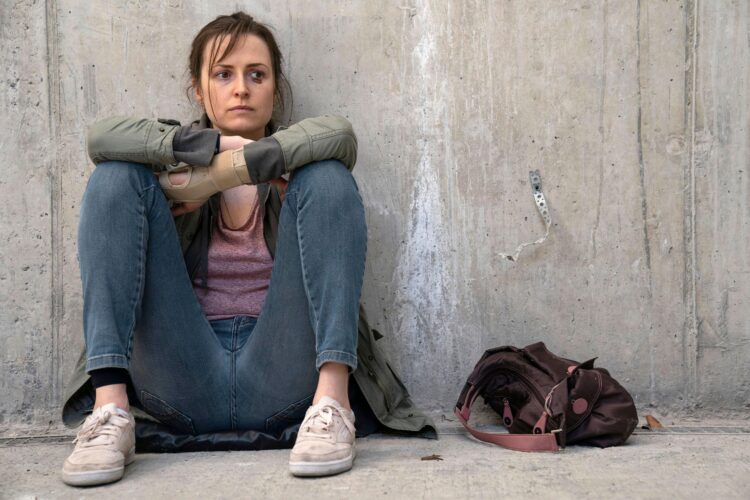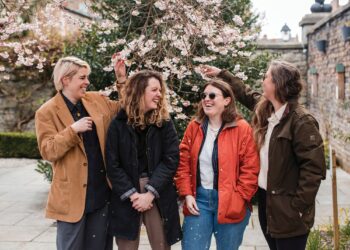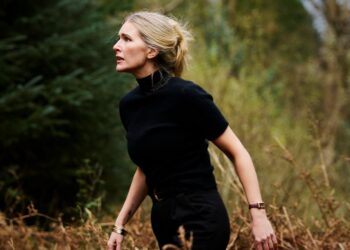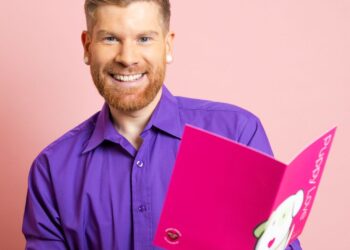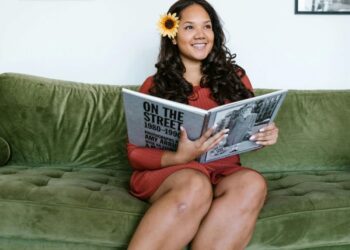In the empowering new film Herself, writer and star Clare Dunne tackles the housing crisis and domestic violence, before delving into the world of gangland crime in new RTÉ series Kin

If writer and actor Clare Dunne isn’t already on your radar, she will be, as in the coming days she is going to be dominating Irish cinema and television screens. Clare has been a rising star on the theatre circuit for years, all the while slaving dilligently over her screenplay, Herself, whih tells the story of a single mother who decides to build her own house after leaving her abusive partner.
Heads were turned in the industry when Iron Lady and Mamma Mia director Phyllida Lloyd came on to direct the project, with prolific actor and writer Sharon Horgan and Element Pictures producing. But then the release of Herself was held up by the pandemic last year, with the unintended consequence of its story, the Dublin housing crisis and domestic violence, becoming even more relevant.
Coincidentally, as Herself finally hits the big screens this weekend, Sunday night brings the first episode of hotly anticipated new RTÉ series Kin, which sees Clare star alongside Aidan Gillen and Maria Doyle Kennedy as members of a Dublin crime family at breaking point.
We sat down with Clare to chat about telling dark stories and the solutions within our grasp.
Clare, why did you want to tell a story about the housing crisis?
I’d already met so many people that have been in a situation like Sandra’s. Also, I’m a millennial in Dublin and as frustrated as everyone is with the housing crisis. I just want to express something for our generation, like let’s look at things differently. But I also wanted it to have humor and great pathos, and also a cathartic feel with great music and this epic inner journey of this woman. I wanted everybody to be in that with her.
Tell us about Sandra, this impressive single mother who gathers a community around her to build a home for her and her children?
This is a story about domestic violence, and housing, but I also wanted that spirit of determined single parent in there. I just really want to embrace that and show the brilliance of the people that we don’t realize are under our noses everyday just walking the streets.
In terms of the domestic violence, I feel like there’s an archetypal picture of the battered woman in our minds. And I think if we really admit it to ourselves, we might be thinking in our heads that we don’t want to watch another story about a battered woman.
I knew what my priority was. I’m not telling a story about a battered woman, I’m telling the story of a soldier who survived the war on her home front. She came out the other side, and she’s trying to start her new life, she is suffering with PTSD and trauma and trying to raise her kids and rebuild herself. I’m not telling the story of a victim. That is why it’s different, and that made the process more enjoyable.
What was it like researching domestic violence for this film?
The research trips, I swear to God they were some of the best days of my life. I just met the most incredible, inspiring people, they’re on the frontline of society, trying to actually change things and change policies. They’re just incredibly knowledgeable about how we work as human beings and as small communities.
I actually found it very hopeful. I think before I did all that research, maybe I just thought everything was a bit of a mess in the world and that we don’t have a clue or that we never will how to fix it. This made me realise that we actually have so many solutions for the housing crisis and also for how we can help people and help not just victims of violence but perpetrators of violence if they are willing to change. Also it made me realise we have so many solutions for climate change. It really enlightened me.
This movie has become even more relevant in the context of the pandemic, as reports of domestic violence are on the rise. How does that feel as a writer, to capture such a sad reality?
It is great when you hit the zeitgeist with a movie. We all love that, but it’s a bit like your man who made that documentary about Afghanistan that’s about to come out, you know it’s great to be hitting the mark, but it’s not great for the people involved is it? What I will say about the rise of domestic violence during the pandemic, I imagine a lot of people who rang those helplines during the pandemic may never have rang before. I watched an online seminar with Women’s Aid, and they were pointing out that the rising numbers of people ringing is kind of a good sign, because lots of people might have been suffering domestic violence silently, but now they are reaching out. The pandemic forced people to stay in one place, and they couldn’t tell themselves anymore that this wasn’t happening, they couldn’t survive this when it was becoming more consistent. I’m not saying it’s a positive, I’m saying the awareness is better. (If impacted by this story, contact Women’s Aid)
The film has been a hit with critics, particularly at Sundance Festival. How does that feel, after the pandemic put the film’s release on hold for so long?
That day in Sundance was a milestone in my life. To be in the car with Sharon Horgan afterwards who was looking at the reviews on her phone, it was so lovely. But what was special too was being surrounded by an audience reacting viscerally to this story because it is not just a story about a woman in Dublin building a house. It is a thriller. You’re in it with her, you feel her breathe and you feel everything that she’s going through.
You experience the violence in different way. We did not glamorize violence. In fact we didn’t show any of the hits. Yeah, we showed what it feels like to receive somebody coming at you and what it sounds like. I felt the audience feel that. By the time it comes to the end of the movie and you are hopefully invested in Sandra’s story, and all of them together, you’re really on the emotional rollercoaster. It’s incredibly satisfying.

We’re also going to see you on the small screen in the highly anticipated new RTÉ crime drama Kin. What can you tell us about your role?
I’m not sure how much I can say! Amanda is basically married into the family, so she’s not blood. But she’s been part of the family since she was 17 or 18. She became a very young mother and basically she is not quite involved at the start in the gangland world,
Then something really awful happens at some point in the series and lots of tough moments for her, so it’s interesting. You’re watching somebody who never wanting to be involved and then ending up roped in. How do you deal with that, when do you give in, or do you give in?
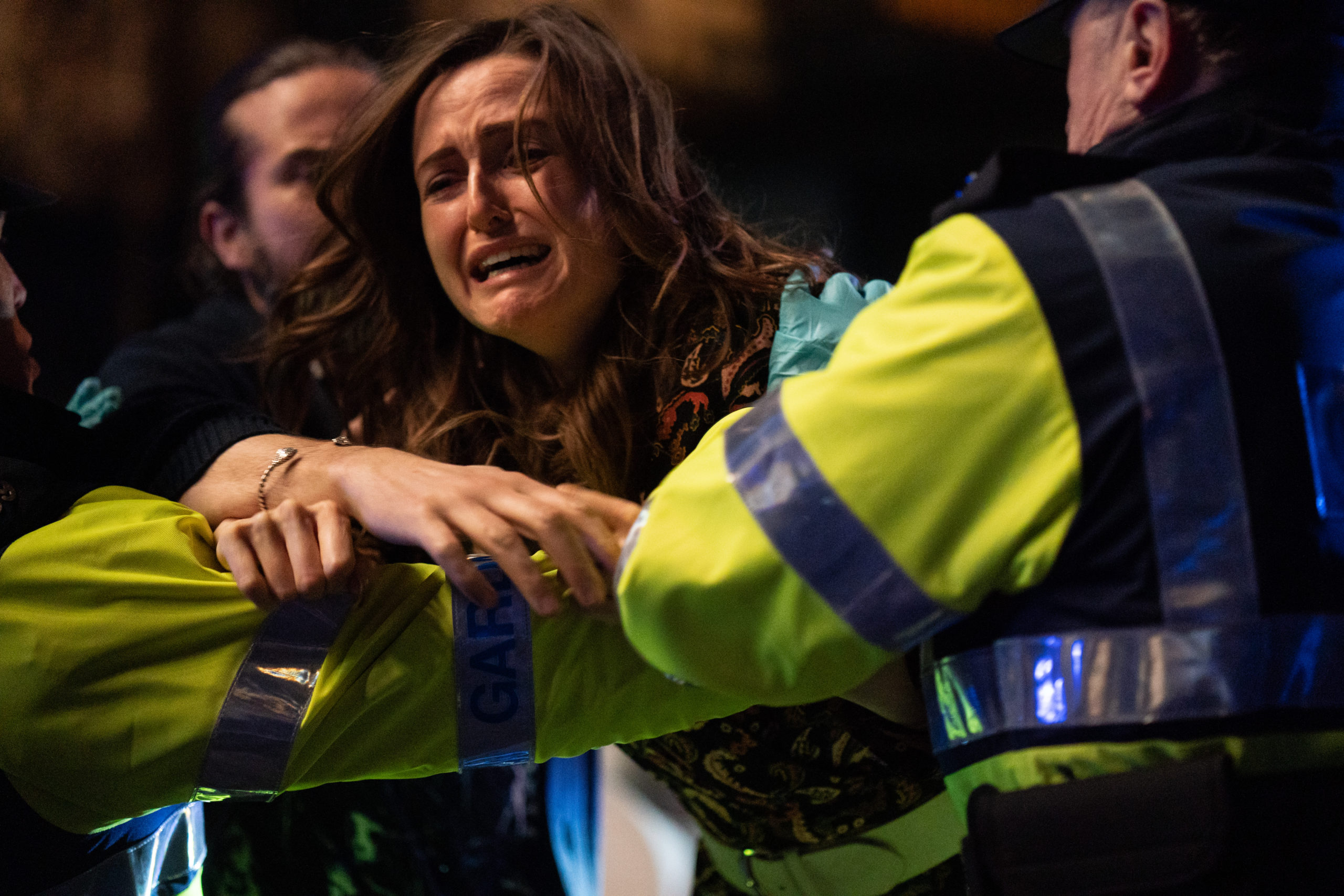
The comparisons to Love/Hate must be inevitable. What sets this apart from the gangland series we’ve seen before?
Kin is more about the family, and about the emotional consequences of being a gang member. Like you’ll often see a lot of violent sequences on screen, but you never see the consequences of what happens to the people that actually get hurt.
This story is not just about the gunfire and moving on, this is about seeing how lives are changed, and the ripple effect through the community. The constant anxiety you’re living under, the feeling of always having your life under threat. That sense of when you go outside into your garden and constantly looking over shoulder? Yes it might be glamourised, yes you have loads of money, but how does it feel to actually live in that world?
Brand New Drama KIN starts this Sunday.. Here’s a sneak peek 🤫 #RTEKin | Sunday 9.30pm | @RTEPlayer pic.twitter.com/sKRGN5KEHZ
— RTÉ One (@RTEOne) September 9, 2021
What is next in the pipeline for you?
I made a lovely short film with the director Hugh O’Connor for kids, it’s called X Marks The Spot. I’ve also been writing a TV pilot. That is in with Element and we’re hoping to finance that soon and get it going. I have written a short film which I am directing, so I have the cast and the production team for that ready to go. We’re shooting in October, maybe November, so that is going to be exciting to be making my first short. So I’m constantly tinkering away with things as a writer, but who knows what will happen with Kin, I am conscious that I might have very little writing time in the coming year.
Herself is in cinemas now. Kin starts Sunday, 12 September on RTÉ One at 9.30pm.

